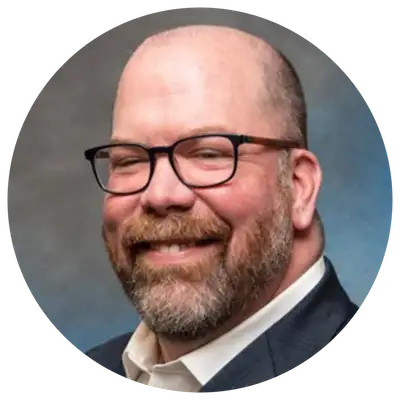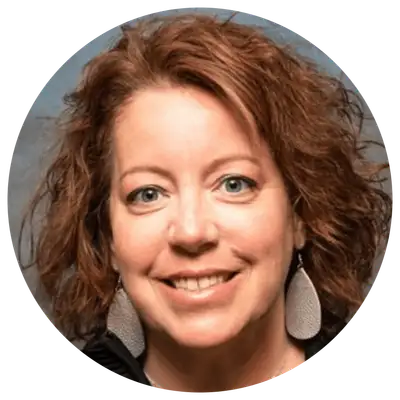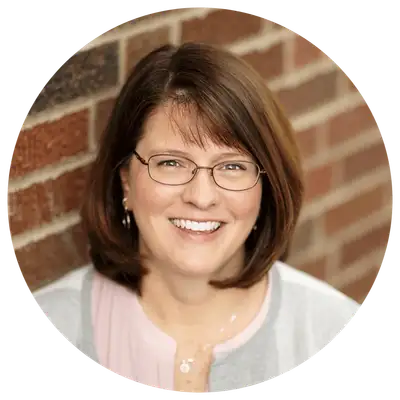Rachel Daniels, Adolescent Literacy Consultant
Produced By:
Creators and Guests



What is The Conversation?
Welcome to "The Conversation", the ESC of Central Ohio's podcast! Join podcast hosts John Hambrick and Rachel Daniels every month as they explore a variety of topics featuring voices in education, helping to ignite ideas and inspire change. Want to be part of "The Conversation"? Email us: christina.gradywatts@escco.org
Season 2 of The Conversation is here! This season we're exploring themes that will keep you informed, excited, and engaged —with a new twist, several of our episodes will include a student’s perspective. Listen along as we ignite ideas and inspire change.
Angela Ullum:
Fifth graders took it upon themselves to do chores over Thanksgiving break because they wanted to spend their own money on things they were going to donate to Star House.
Speaker 3:
That was Angela Ullum, Chief Academic Officer at Grandview Schools. On this episode of the conversation, she'll share how a service learning simulation impacted and created change in their school community. Let's dive in.
John Hambrick:
Hello and welcome back to The Conversation, Ohio voices in education igniting ideas, inspiring change. And I'm so grateful to be back with my esteemed colleague, Rachel Daniels. And holy cow, we are really getting into it today, talking about service learning. Very fortunate to have Angie Ullum with us. She is Chief Academic Officer in Grandview Heights. Angie, welcome to The Conversation.
Angela Ullum:
I'm excited to be here.
John Hambrick:
Fantastic. Yay. Hey, so we understand Grandview Heights is focused on expanding service learning this year. What's driving the change?
Angela Ullum:
Well, I've been in Grandview now for 10 years, and service learning's always been part of our culture. However, COVID slowed everything down. So as we started to reboot with our strategic plan, we got our teachers, students, alumni, community members all together. And their number one priority came to the front as intentionally designed authentic learning. And so what better way to revive authentic learning than to revive our service learning initiatives?
So we are focused on really helping children have personalized experiences and connecting with their community to increase not only their academics, but also their well-being. I also sit on the partnership for Authentic Learning and Leadership. They have a summer institute I'm part of. Last summer their institute's focus was, or two summers ago, their institute focus was making learning irresistible, and the entire focus was on experiential learning.
And it brought so much excitement to everybody who attended the conference. And the district members who went with me also felt that excitement and they were so excited to really start doing something different in the classrooms again. And that's when we decided service learning would be part of our district initiative this year.
Rachel Daniels:
Hey, Angie, could you tell us about your partnership with the Ohio Association of Community Action Agencies? And if you will, share a bit about the simulation experience and the purpose behind it?
Angela Ullum:
Sure. So this is not only tied to service learning, but we've also been working on diversity, equity, inclusion. And one of the things we really wanted to explore was to look at economic diversity. So as a leadership team, we collaborated with the Ohio Association for Community Actions and Agencies, and they host professional developments and they host a poverty simulation. And we thought that would be a great way for our teachers to have an experience to help us look at economic diversity and really would be really impactful.
So on the first day of school, about half of our staff came and we did a poverty simulation. And it's interactive. And the nice part of it is it's based on Ohio families who are not necessarily completely on assistance, but they're below the poverty line in Ohio. So then our staff was given real life situations. We were given the amount of money we were making, we were given families, and then we were given scenarios we had to navigate throughout the day.
And it was extremely challenging. It was extremely emotional and it wasn't lightning to a lot of our staff. We had some things where we were budgeted to the penny, at least in my simulation, my family, we were budgeted to the penny and if anything happened, we didn't have enough money to cover things. So there were times that we were having to make decisions between paying the electric bill or buying groceries.
Some of the other staff and their families, they were trying to find assistance, but they had mounds of paperwork to fill out and maybe in their simulation, their reading skills were not high enough to finish all the paperwork. Also, they would stay home to finish the paperwork, then they couldn't go to work, so then they wouldn't have a paycheck that paid all of their bills. We found it as we were making these really hard decisions, the stress, even in us though it was a simulation was real.
The other thing that we learned is sometimes school impose really hard parameters on families. So for instance, a family simulation was your child was misbehaving and had to go pick them up at school, which means you had to miss work. And then when you missed work, your paycheck was not the full amount, and then you're having to make decisions, gas, groceries, those types of things. So this work really started us thinking about, this doesn't have to be someone who's unemployed.
This can be someone who's working, but they're just barely making enough money to make ends meet. So as a district wellness committee, we started thinking like, "Okay, what can we do as a community and what are some things we can do here in Grandview?" So one of the ideas that came out of that besides our day of service was our wellness committee put together a group, and we've started a Neighborhood Bridges in our community.
And this is a charitable organization that started in response to growing poverty in America. And what happens is we find needs within our school, the fire department might find needs within the community. And when you put it up on a website, and then anyone who's able to take care of those needs does so. So that was one way we thought, "Okay, this experience has impacted us and we can do something about it." And then as teachers, we said, "Okay, how can we build empathy in our kids?" And that's when the day of service just became a stronger and had more momentum in building.
Rachel Daniels:
[inaudible 00:06:30], I want to jump in and say, I love that you wrapped that up with highlighting empathy. And the other thing that comes to my mind is the way in which you're teaching students and all the members of your community about what it means to be vulnerable.
And I think that when we shine a light on situations that might feel shrouded in shame, like not being able to provide something to your family or having a basic need, it's important for folks to learn to use their voice, to speak up and ask for help. So I love that you're creating a community where, again, we're bringing those needs into the light and allowing ourselves to be open and vulnerable for help and support. So really appreciate what you shared there.
Angela Ullum:
The Neighborhood Bridges program is phenomenal because sometimes it creates an opportunity where the police department can say, "Hey, we had a fire in this house and they're missing these things." We can put that up on Neighborhood Bridges as a need and fill those needs without anyone having to ask. And sometimes that allows people to accept help, and then maybe the next time they won't feel so burdened to ask for help.
Rachel Daniels:
Impactful.
John Hambrick:
Who knew the game of life could translate into extremely raw, real-world emotion. Incredible. Thank you for sharing that. I'm also interested, and I think our listeners, was there additional impact as a result of this experience with your teachers?
Angela Ullum:
Well, the day of service then took life. And so I would say that that also had a huge impact on our school. So we started thinking differently about how we can build empathy within our students and what we could do to get kids involved at young ages and let them know they really can make a difference. So at each grade level, our day of service looked a little bit different, and it was all based in standards, Ohio standards in some form or another.
So at Stevenson Elementary, we really focused on wants and needs and Community connections because that's something young children can really understand. And then we chose organizations around us that our students could support. So we worked with Faith Mission, the Neighborhood Service Food Pantry, Riverview International Services and Seeds of Caring to get our kids involved. And it was just amazing all the different things that kids started doing.
We went from helping people with food to clothing, to just providing some friendship with elderly people in our neighborhoods. And then a Larson or at Larson Middle School, our staff decided to adopt Star House, which is an organization that supports teenagers who may be homeless for one reason or another. And we brought Star House in to talk to the students about how do teenagers end up homeless and when that happens, what do they need and how long are they there?
And so we started doing blankets and clothing and hygiene and just cards with words of hope for those kids. And that was pretty powerful. The kids were very excited about working. And then the high school took a completely different spin on the day of service, and we surveyed our kids about, "If you could make an impact in the community, what would you be interested in getting behind? What would you put your time and effort into?"
And so then we took that data and then we found organizations that met the kids' interests. So we had Salvation Army, the Bobcat Boosters, the Franklin County dog Shelter, Families for Families, Girls on the Run, Homes for Families, Huckleberry House, Rosanne Rosen, and the Start Talking Grandview. And then on the day of service, our student organizations came that were already in existence and told about their purpose and what they do to serve the community.
And then students left like they would be, if they were adults at a conference. They left and went to five different sessions and listened to those organizations, and they listened to what their problems were, what their needs were, and they decided how they could get involved. And I think the coolest thing that came out of that is that after this mini conference, the kids all came together and they reflected and talked, but then our already existing service clubs, they came together and formed a super club so that they could put all their efforts together.
It was just a day that was so amazing. And since then, we've come back together as a staff and I've gotten some feedback. And it's amazing because the reflection from my staff is really more about, "Can we embed this all year? This was a great feeling, but we want it to be more than just a day." So we're looking at next year, how can we do this so that it's embedded throughout the year.
Rachel Daniels:
So Angie, you mentioned the impact of the simulation on educators. You noted a couple of thoughts around student impact, but do you have any sort of case studies around this visible example of the impact that this work has had with your students? And if so, could you share those with us?
Angela Ullum:
Sure. I think one of the greatest things is I went down to Stevenson to just kind of see what was going on during the day. And I ran into a second-grader and she wanted to explain to me that her class had learned about people who moved to Ohio from other countries. And she wanted me to know that sometimes people have to come and they can't bring all their belongings with them. And that was really worrisome to her. And then she said, "Do you know that some people come from countries and they never have snow? So then they don't have all their belongings and they don't have clothes for cold weather."
So she explained to me that they were collecting gently used and new coats for immigrant families who just moved here. And then she told me if I wanted to learn more, I could watch her commercial. She had so much pride in her voice and her eyes sparkled as she told me about this project. She really felt like, "I'm seven years old and I'm going to make a difference in someone's life."
Fifth graders took it upon themselves to do chores over Thanksgiving break because they wanted to spend their own money on things they were going to donate to Star House. And it wasn't part of the original plan, but then the fifth grade teachers were, enough students were doing it that they shared it with everyone. And they ended up going to Big Lots and all spending their money to donate to Star House.
And we've gotten some really great thank you letters, and when you hear the kids talk about it, it feels so good to know that they're helping kids similar in age. And then I also mentioned the Super Club, and that has been just amazing. I mean, my high school students are on fire. They have a drive and a passion, and they're following it and it's just been amazing. There's an energy and excitement, and it's nice to know that the students and staff all took away that same kind of feeling. And the other thing is, one of the other nice parts of service learning is you're embedding standards.
So you're hitting academics, you're teaching kids about empathy, but there's also lots of studies that show that when someone else, when you're helping someone else and you're being a part of something bigger than yourself, it helps everyone's mental health. And with a mental health crisis that's part of our communities right now, this was true proof that the feeling, the palpable feeling in everybody's involvement, it really does make everyone feel better and excited to be part of something bigger than themselves.
Rachel Daniels:
Well, as you know, the sphere I work largely in is literacy. And as you're speaking, one point that is bubbling to the surface for me is the way that you're helping students to build background knowledge around lots of components that might not just naturally work their way into the classroom. And I find that to be a really powerful use of this time and providing students with opportunities that they might not otherwise have.
And it really sounds like they've risen to the challenge and they're turning many of the opportunities into authentic experiences kind of driven by their own passion. So that's really powerful to hear about. Well, yet again, folks, our time has quickly come to an end. Angie, we want to thank you for joining us today. As always, we're grateful to our listening audience and hope you've all found inspiration in the ongoing service learning work, empathy building, and community work happening at Grandview Heights. For John, this is Rachel. Take care, stay curious and keep the conversation going.